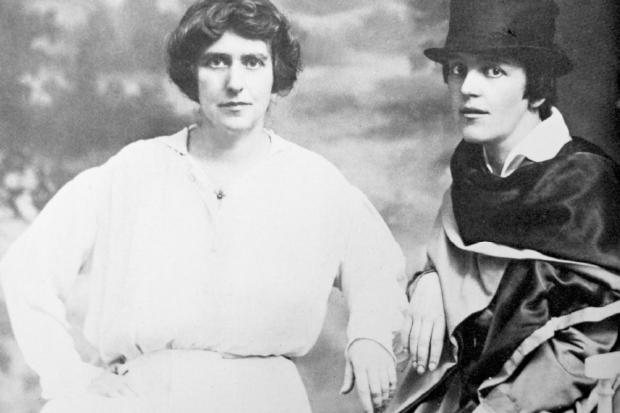The Comintern was the name given to the international communist network in the Soviet era, advancing the cause wherever it could. The ‘Homintern’, a wry play on that, was first coined at Oxford by Maurice Bowra and gladly passed on by Cyril Connolly, Auden and others, inferring an international homosexual network of mutual interest and support. Gregory Woods, in his very first sentence, defines it thus: ‘The Homintern is the international presence of lesbians and gay men in modern life.’ A few pages later he says: ‘There was no such thing as the “Homintern”.’ So which is it to be? And what does Woods mean by ‘modern life’? The opening chapter, which is a suave yet bracing demolition of homophobia, leads one to suppose that these vital questions will in due course be answered.
But the next few hundred pages merely collate writers and artists who happened to be gay. Most of them are from the late-19th to the mid-20th century. There is no doubt that the cultural vanguard, from Oscar Wilde onwards, has included a very large number of gay and bisexual people, and not only in Europe and America. Gide, Proust, Cocteau, Diaghilev, Nijinsky, Gertrude Stein, Cole Porter, Strachey, Auden, Isherwood, Thomas Mann, Pessoa, Cavafy, Forster, Virginia Woolf, James Baldwin, William Burroughs, Aragon, Jean Genet, Lorca, Pasolini, Fassbinder, Mishima, Patrick White, Francis Bacon, Benjamin Britten, Aaron Copland, John Cage… one could go on and on. And Gregory Woods does, presenting a hectic parade of major and minor figures, in what amounts to a gay gazetteer divided into geographical regions, supported by literary references and social tittle-tattle.
Much of this is fascinating if you don’t already know it. But most of it is already well-covered in a host of candid biographies, as well as in Woods’s own A History of Gay Literature. The chief problem is that no overarching impetus mobilises the constipated mass, so that one soon begins to wonder where all this is leading. What is it about the art of these gays that is liberating? Why are they different from a list of, say, artists who are left-handed?
The literary component is thoroughly referenced, but one should be wary of the tittle-tattle. He reports, for example, that when Wilde and Diaghilev walked through Paris arm in arm the prostitutes climbed on chairs to jeer at them. Woods doesn’t say that this was something Richard Buckle learned from Boris Kochno who heard it from Diaghilev, who was a fabulist. Elsewhere we are told that Lord Montagu, imprisoned for gay sex in the 1950s, was celibate in prison because he didn’t want to be ‘a trophy fuck’. In fact I used those words to Lord Montagu in a private interview which has not been published, and Montagu agreed with me. I’m not aware that he ever used the phrase himself. So where does Woods get this from? He doesn’t say.
Which brings us to the problem of that subtitle. Since most of these people led highly secretive sex lives, oppressed by shame and the law, how did their gayness liberate the wider world? Very few made public pronouncements on gay issues — Gide, Pasolini, Burroughs, who else? In terms of gay culture, they have had influence only retrospectively, post-liberation, as their stories have been published and they have become historical role models. Even Auden and Cocteau — well-adjusted gays if ever there were — never made public pronouncements on their sexuality.
The last chapter returns to the dynamic of the first; but in focusing on the 1967 legalisation of gay sex in the UK, it implies that this is the author’s cut-off date. In fact there is much in the book that drifts beyond it — a whole section on the writer Manuel Puig, for example — while massively influential and effortlessly ‘out’ Warhol and Warholism are ignored altogether. The book generally has little on the fine arts, and nothing on fashion and design, radio and television, nor the gay liberation movements of the late 20th century.
Then there are the fellow-travellers, those not-really-gay people who have nonetheless been hugely important to gay culture: Fellini, who made Satyricon, the gayest film ever to receive mainstream distribution, is ignored; David Bowie, who liberated millions, is ignored; Kinsey, apart from an oblique reference, is ignored. There is nothing about the adoption of gay scenarios and slang by the hetero mainstream, or about the boom in gay studies, or about street culture and clubbing, or gender-bending or performance art or Aids or the internet. Woods’s ‘modern world’ is not modern at all. Most of his book could have been written 50 years ago.
As for ‘liberation’, we never discover what he means by it; nor the relationship between personal emancipation and the arts; and without a theory of the avant-garde, it is impossible to judge what contribution homosexuality has made to it. As for that thrilling word ‘how’ — the clarion of enlightenment — that’s ignored too. Which is a shame, because there is indeed an important book to be written on ‘how gay culture liberated the modern world’.






Comments